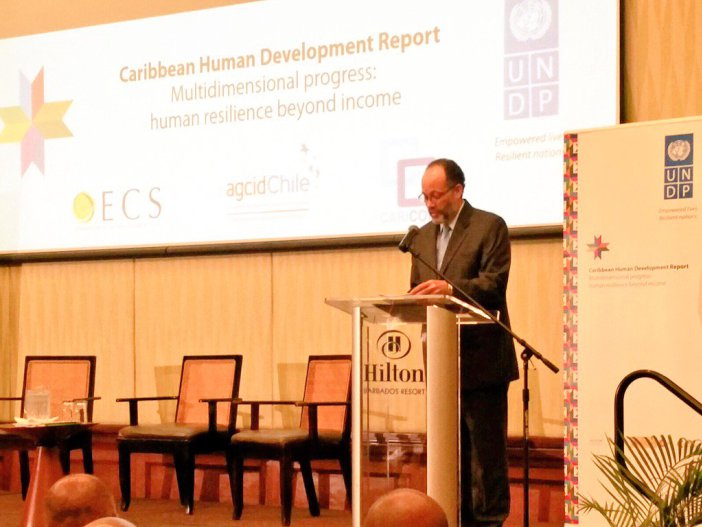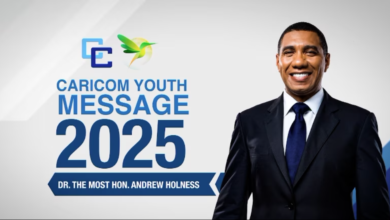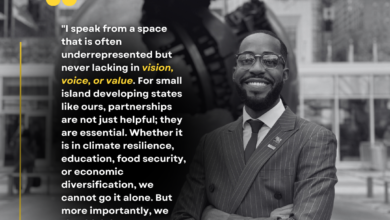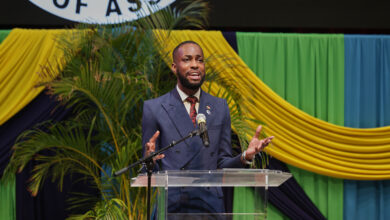I would like to offer some information on what we are doing on two of the areas covered in the Report, namely, Youth Development and Human Resource Development.
The CARICOM Commission on Youth Development’s landmark report, “Eye on the Future”, has spawned the CARICOM Youth Development Action Plan. It promotes the development of secure, valued and empowered adolescents and other youth, realising their full potential, and contributing to a sustainable Caribbean Community. Significantly, our CARICOM Youth Ambassadors have been actively involved in the shaping of this Plan and will be assisting in its implementation.
Some of the recommendations are already being acted upon, particularly with regard to youth entrepreneurship, leadership training and the engagement of at-risk youths.
Given the unacceptably high rates of youth unemployment, action is being taken to address that challenge. Apart from encouraging entrepreneurship through the Creativity for Employment and Business Opportunity Programme, CARICOM is seeking to prepare its youth through the continual alignment of education and training with the emerging academic, technical and social skills and attitudes required for the twenty-first century labour market and society.
To guide this process, we have established a Commission on Human Resource Development which will, among other things, devise a Regional Education and Human Resource Development Strategy. One of its main guidelines is for the adoption of a holistic approach to education in the Region. That Commission is undertaking a comprehensive high-level and empirical review and, in so doing, particular emphasis will be placed on fostering creativity, innovation and entrepreneurship from the earliest level.
CARICOM Secretary-General Ambassador Irwin LaRocque addressing the Launch of the United Nation’s Development Programme (UNDP) Caribbean Human Development Report – Multi-Dimensional Progress: Human Resilience Beyond Income, in Bridgetown, Barbados, Monday 12 September 2016.
Read full address:
REMARKS
BY THE
SECRETARY-GENERAL
CARIBBEAN COMMUNITY (CARICOM)
AMBASSADOR IRWIN LAROCQUE
AT THE
LAUNCH OF THE UNITED NATIONS DEVELOPMENT PROGRAMME (UNDP) CARIBBEAN HUMAN DEVELOPMENT REPORT
Multi-Dimensional Progress:
Human resilience beyond Income
Bridgetown, barbados
12 september 2016
Sen. the Honourable Maxine McClean, Minister of Foreign Affairs and Foreign Trade, Barbados;
Ms. Helen Clark, UNDP Administrator;
Ms Jessica Faieta, United Nations Assistant Secretary-General and Regional Director for Latin America and the Caribbean, UNDP;
Honourable Ministers;
Dr. Didacus Jules, Director-General, Organisation of Eastern Caribbean States;
Sir Hilary Beckles, Vice-Chancellor, University of the West Indies;
Other invited Guests;
Representatives of the Media.
Our Caribbean Community has been pursuing the path to sustainable development with the firm belief that people must be at the centre of development. With that in mind and given the subject matter, it was without hesitation that I accepted the invitation to participate in the Launch of the United Nations Development Programme (UNDP) Caribbean Human Development Report for 2016.
This important document gives us insights into the impact that our development efforts are making on the lives of our people. Of equal importance is widespread acknowledgement that development is about improving all aspects of life. The title of this Report, “Multidimensional Progress: Wellbeing Beyond Income”, is an apt reminder of this fact.
The Report emphasises that as important as economic and financial status as indicators undoubtedly are, quality of life is also a critical determining factor in the level of development of a society. The first Objective of the Community listed in the CARICOM Treaty is “improved standards of living and work”. Indeed, this was re-enforced in 2011 by Heads of Government when they “agreed that the objective of the Regional Agenda should be focussed on Improving the Lives of the People of the Caribbean Community”.
In pursuing that objective, the Community, among other things, devised a Strategic Plan for the period 2015-2019 which emerged from exhaustive and widespread consultations throughout the Community, among an extensive range of stakeholders. This Plan includes building Social Resilience among its integrated strategic priorities. The goal of that priority is “to ensure sustainable human and social development in the Region, with reduced levels of poverty and equitable access by vulnerable groups and significant improvement of citizen security by facilitating a safe, just and free Community”.
Strategic interventions emphasised by the Plan include areas related to the youth, the elderly, persons with disabilities, gender, education and health and wellness. Work has been on-going in those areas for some time but there is a lot more to be done.
The perspectives outlined in the Human Development Report will be of value to CARICOM as we strive to achieve the desired outcomes of the Strategic Plan. These are strong economic growth and reduction in poverty and unemployment; improved quality of life; reduced environmental vulnerability and an integrated Community with equity for all.
The themes of resilience and vulnerability are central to the Report and resonate strongly with us in the Caribbean Community. Of particular interest is the focus on the vulnerability of our citizens as we grapple with the significant challenges of this period.
Our peculiar economic, social and environmental vulnerabilities lie at the core of the difficulties we are experiencing as we strive to advance our development goals.
The Report recognises the multi-dimensional nature of human vulnerability and proposes an inter-sectoral approach to address the issue. Building resilience to counteract vulnerabilities; the participation and meaningful involvement of the youth and other vulnerable groups; and investing in skills training are essential requirements in our pursuit of a prosperous, stable and viable society.
I would like to offer some information on what we are doing on two of the areas covered in the Report, namely, Youth Development and Human Resource Development.
The CARICOM Commission on Youth Development’s landmark report, “Eye on the Future”, has spawned the CARICOM Youth Development Action Plan. It promotes the development of secure, valued and empowered adolescents and other youth, realising their full potential, and contributing to a sustainable Caribbean Community. Significantly, our CARICOM Youth Ambassadors have been actively involved in the shaping of this Plan and will be assisting in its implementation.
Some of the recommendations are already being acted upon, particularly with regard to youth entrepreneurship, leadership training and the engagement of at-risk youths.
Given the unacceptably high rates of youth unemployment, action is being taken to address that challenge. Apart from encouraging entrepreneurship through the Creativity for Employment and Business Opportunity Programme, CARICOM is seeking to prepare its youth through the continual alignment of education and training with the emerging academic, technical and social skills and attitudes required for the twenty-first century labour market and society.
To guide this process, we have established a Commission on Human Resource Development which will, among other things, devise a Regional Education and Human Resource Development Strategy. One of its main guidelines is for the adoption of a holistic approach to education in the Region. That Commission is undertaking a comprehensive high-level and empirical review and, in so doing, particular emphasis will be placed on fostering creativity, innovation and entrepreneurship from the earliest level. Focus will also be placed on education as a means of addressing the gender gap in the labour market.
A notable shortcoming identified by the authors of the Report relates to the unavailability of statistics, or of up-to-date statistics which they point out makes evidence-based decision and policy making “extremely difficult”.
It is a deficiency that has been recognised by our Heads of Government. At their Meeting last July, in acknowledging the importance of statistics to governance, to planning and policy making, and to the Region’s efforts to attain sustainable development, they endorsed an Action Plan for Statistics.
That Action Plan, among other things, will seek to strengthen national statistical systems, as well as upgrade the Information and Communications Technology infrastructure to support these systems. Success in this regard would provide a more reliable foundation for research in your succeeding Reports.
Further, the Community will be requesting of the UN that with regard to Statistics, CARICOM should be viewed as a distinct grouping within the Latin America and Caribbean area. This distinction is fundamental, as the data would be focused on the peculiar challenges that are faced by the Small Island Developing and Low-Lying Coastal States (SIDS), which constitute our Community, most of which are designated as Middle Income Countries. This Report has demonstrated the value of such an approach.
Ladies and Gentlemen, the Caribbean Community has been actively pursuing its goals, notwithstanding its limitations with respect to human and financial resources. We are extremely appreciative of the assistance towards achieving those goals, which is being rendered by our development partners. In that regard, the United Nations system, particularly the UNDP, is a most valuable and longstanding ally.
In UNDP Administrator, Ms. Helen Clark, our Region and other SIDS have found a true champion. Ms. Clark’s commitment to the development of small states has been a hallmark of her tenure. I had the pleasure of working with her as she co-chaired the Political Champions for Disaster Resilience, from which Haiti was a beneficiary.
I have witnessed at first hand her advocacy in various fora and her attentiveness and sensitivity to the interests of small states. She has been particularly tireless in advocating to the OECD, the World Bank and the IMF the need to review the criteria for access to concessional development financing for SIDS that have been graduated due to Middle Income status. As she stated in the foreword to this Report “development does not expire at a GDP threshold”. The issue of vulnerability therefore, must form part of the criteria for access to concessional development financing, and this Report lends support to that approach.
Helen, your support is highly appreciated.
In closing, I am certain that as we get an opportunity to look even more closely at this Human Development Report, it will prove to be a valuable resource and be of benefit to our Region as we pursue our development goals. It can also be a useful reference point from which we can measure our progress in achieving the Sustainable Development Goals under the 2030 Development Agenda to which our Governments are committed.
This Report recommends that “a fundamentally new approach to Caribbean economic growth focused on human progress is needed” and that “issues affecting human progress should be treated as central and priority elements in comprehensive growth and development strategies”.
This is in keeping with the vision of our Heads of Government as expressed in 2014 in the CARICOM Declaration on the International Development Agenda Post 2015. The Heads of Government declared that: “the development agenda must be premised on promoting the welfare and well-being of all people; it should promote and mainstream sustainable development and the balanced integration of its three dimensions – economic, social and environmental – at all levels; and that it should build on the lessons of the Millennium Development Goals (MDGs) toward a single comprehensive and integrated agenda that is responsive to the diverse development realities with which individual countries and regions are confronted.”
That is what we in the Caribbean Community are seeking to do.
I thank you.
I thank you.







